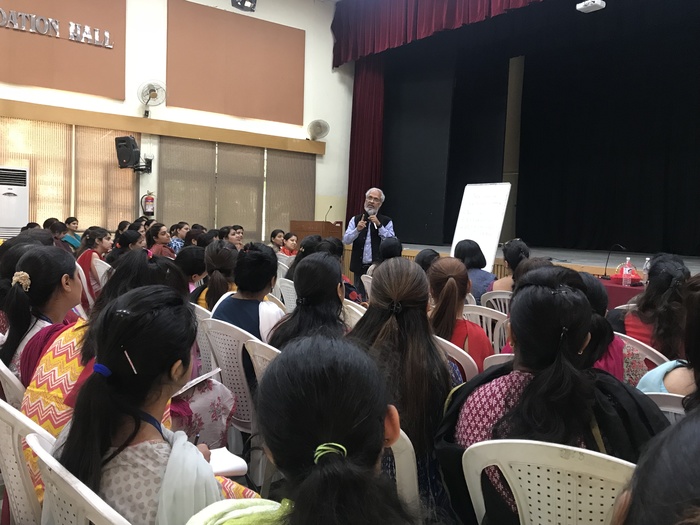Teacher workshop on Motivation
On 25 June 2018, a motivational workshop, Aspects of Education was conducted for the teachers of our School by Dr. V. S. Ravindran, well known and popular educational psychologist and trainer. Dr. Ravindran has been involved in the training of personnel in leadership positions at educational institutions, corporate and governmental organisations for over two decades. His areas of expertise are leadership development, counsellor training, and teacher education. Dr. Ravindran has been instrumental in starting counselling and guidance programmes at many reputed educational institutions in India and abroad. Presently, he is Director-General of ICTRC.
The workshop began by describing the evolution of the role of a teacher, from being lecturer to facilitator, coach and mentor- in fact now the teacher is responsible for the holistic development of students. Earlier, the content was teacher-centric but now it is student-driven. The content and context are now set in accordance with student needs.
Dr. Ravindran recommended the creating of a dynamic learning environment by applying interesting content to hold the attention of students whilst simultaneously addressing their problems. He highlighted the significance of omitting the word normal and replacing it with typically developing children.
[gallery link="file" order="DESC"]
Expounding upon the cognitive development of the child, Dr. Ravindran elucidated that our chronicled age and mental age may not always be the same. A little difference in its ratio could affect our Intelligent Quotient (IQ). For different IQs, psychologists have developed distinctive teaching methodologies to mentor the students and prepare them well for problem-solving situations. For example, students with a below average IQ need to be assigned tasks of a lower volume and intensity, as their retention and reasoning abilities are not compatible.
The second half of the workshop focused on behavioural management. Dr Ravindran said that it is very important for a teacher to be reasonable with students. However he cautioned not to try reasoning with them. The teacher must respond to a childs problem professionally and not personally. Behavioural problems can be categorised as deviations from the norms, negative behaviour, intensity and hindrance to learning and development. These, they need to be dealt with in their own appropriate ways.
Dr. Ravindran suggested that, when a child engages in misconduct or inappropriate behaviour, the teacher should never act on the spur of the moment, as it were. Instead " Strike the iron when it is cold, he appealed. Conversely when the child shows an improvement, the teacher must appreciate and point out gently how he/ she erred earlier. She must explain how valued he/ she is and therefore it is important to conduct oneself appropriately. Prevention of behavioural issues can be managed by being definite, consistent, persistent, friendly ( but not friends), and being positive.
At the beginning of the session, Dr. Ravindran asked for examples of practical problems faced by teachers faced in classroom situations. In the concluding session, he answered these questions in-depth. The queries were mostly about inclusive education and dealing with hyperactive children.
The workshop concluded on an inspirational note -I am not A teacher, I am THE teacher.
Ms. N. Shergill.













